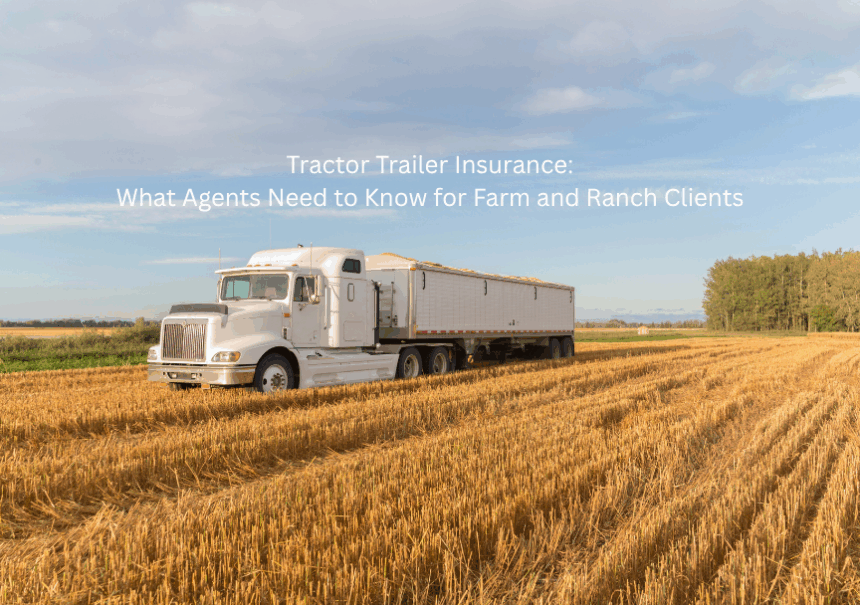If you’re writing farm truck auto policies as part of a larger farm and ranch package, you’ve likely come across tractor trailers.
And while it’s easy to assume they’re just another line item on the schedule, tractor trailer insurance carries some key nuances agents need to be aware of.
Policy Placement and Usage Rules
Tractor trailer insurance for farm clients is not a one-size-fits-all policy. Tractor trailers used in farm operations generally must be placed on a farm auto or commercial auto policy, not on personal lines or farm personal property. This is especially true when the trailer is titled to an LLC or used on public roads.
Before placing coverage, agents should prepare a full inventory of all farm vehicles, including tractor trailers, and clarify each unit’s title, primary use, radius of operation, and licensing status.
One of the most important questions to ask your client:
“Are you using this trailer for hauling your own goods, or hauling for others?“
If it’s the latter, farm auto coverage likely doesn’t apply. The trailer must be used exclusively in support of the insured’s farming operation, otherwise, you may need a separate commercial trucking policy.
Lay Up Credits: A Tool Every Agent Should Know About
When a trailer is laid up (temporarily out of use and off public roads), some carriers, such as Travelers Agribusiness and Liberty Mutual, allow liability and collision coverages to be suspended.
During lay up periods, only comprehensive coverage stays active, protecting the vehicle against fire, theft, vandalism, or weather while in storage. In return, the client receives a lay up credit, which can reduce their premium significantly during the lay up period.
However, unauthorized road use of a tractor trailer during a lay up period is a serious breach of policy terms and could lead to the denial of claims and the owner of the vehicle being liable for any damages or injuries caused.

As a managing general agency, Stroud works with agents to enter “from” and “to” dates to ensure coverage resumes automatically when the lay up ends. It’s a great cost-saving tool but one that requires proper documentation and clear communication with your client when adjusting their tractor trailer insurance policies.
What’s Not Included in Tractor Trailer Insurance Policies?
An important detail for agents writing tractor trailer insurance: physical damage coverage is not automatically included. That means comprehensive and collision coverages must be specifically selected and scheduled.
Even more important: any permanently attached equipment or specialty features, like toolboxes, custom electronics, spray rigs, or other modifications need to be itemized and valued. If these aren’t scheduled, your client could be left underinsured at claim time.
Be sure to:
- Ask about add-ons and modifications
- Confirm vehicle replacement value
- Follow up on any newly acquired trailers (some carriers provide automatic coverage for only 60 days)
Best Practices for Agents Placing Tractor Trailer Insurance
To place tractor trailer insurance with confidence and reduce E&O exposure, keep these best practices in mind:
- Confirm the tractor trailer is used exclusively for the farm or ranch operation (not for-hire)
- Ensure the tractor trailer is correctly titled and licensed, and note whether it leaves the farm
- Confirm the tractor trailer’s radius of operation
- Schedule all physical damage coverages and accessories
- Ask about seasonal use and consider applying lay up credits
- Keep driver and vehicle lists current
- Discuss umbrella liability if exposures exceed standard auto limits
- Review policy exclusions for non-farm use or competitive events
Ready to Quote Tractor Trailer Insurance?
If you’re ready to quote a farm and ranch policy that includes tractor trailer insurance, simply complete our Farm and Ranch Quote Request Form and submit the Truck-Tractor-Trailer Questionnaire as well.
Have questions? Our team is always here to help. Contact us here.

